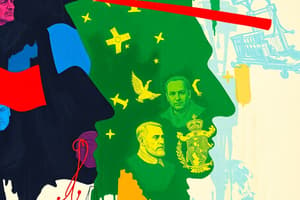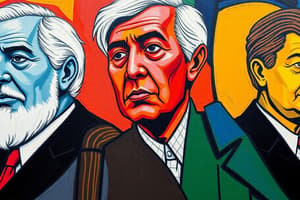Podcast
Questions and Answers
What do you think of nationalism?
What do you think of nationalism?
Nationalism is the belief that one's nation is superior to others.
What is necessary for the development of an international order?
What is necessary for the development of an international order?
The development of an international order requires cooperation and respect between nations.
What do you think of the League of Nations?
What do you think of the League of Nations?
The League of Nations was an international organization established after World War I.
What is the role of revolution in internationalism?
What is the role of revolution in internationalism?
What does the term Internationalization refer to?
What does the term Internationalization refer to?
What does the term Globalization refer to?
What does the term Globalization refer to?
What are the 4 key attributes of world politics?
What are the 4 key attributes of world politics?
What is a country?
What is a country?
What is a sovereign state?
What is a sovereign state?
What is sovereignty?
What is sovereignty?
What is a state?
What is a state?
What are the 4 key attributes of state?
What are the 4 key attributes of state?
What is a nation?
What is a nation?
Nations are born out of two factors, what are they?
Nations are born out of two factors, what are they?
What are two ways to classify a nation?
What are two ways to classify a nation?
What is a nation-state?
What is a nation-state?
How are the words 'state' and 'country' typically used?
How are the words 'state' and 'country' typically used?
What is the Treaty of Westphalia?
What is the Treaty of Westphalia?
What was the key outcome of the Treaty of Westphalia?
What was the key outcome of the Treaty of Westphalia?
What were the three key ideas associated with the French Revolution?
What were the three key ideas associated with the French Revolution?
What was the Napoleonic Code?
What was the Napoleonic Code?
What is meritocracy?
What is meritocracy?
What was the Concert of Europe?
What was the Concert of Europe?
Who was the main architect of the Metternich System?
Who was the main architect of the Metternich System?
What is internationalism?
What is internationalism?
What is the core belief of internationalism?
What is the core belief of internationalism?
What is nationalism?
What is nationalism?
What does nationalism involve?
What does nationalism involve?
What is international law?
What is international law?
Who coined the term 'international law'?
Who coined the term 'international law'?
What is the core function of international law?
What is the core function of international law?
What is the difference between international law and international comity?
What is the difference between international law and international comity?
What are some of the core concepts of liberal internationalism?
What are some of the core concepts of liberal internationalism?
What is self-determination?
What is self-determination?
What is the legal meaning of self-determination?
What is the legal meaning of self-determination?
How is self-determination enshrined in international law?
How is self-determination enshrined in international law?
What is the League of Nations?
What is the League of Nations?
What was the objective for creating the League of Nations?
What was the objective for creating the League of Nations?
What was the legacy of the League of Nations?
What was the legacy of the League of Nations?
What was the Socialist International?
What was the Socialist International?
What was the goal of the Socialist International?
What was the goal of the Socialist International?
What was the goal of the Communist movement?
What was the goal of the Communist movement?
Explain Communism as a doctrine.
Explain Communism as a doctrine.
How do Communists view Communism in relation to Socialism?
How do Communists view Communism in relation to Socialism?
What was the Comintern?
What was the Comintern?
What was the objective of the Comintern?
What was the objective of the Comintern?
What was the role of the Comintern in the international communist movement?
What was the role of the Comintern in the international communist movement?
What was the Cominform?
What was the Cominform?
What was the Cominform's primary function?
What was the Cominform's primary function?
What was the primary function of the Cominform in the Cold War?
What was the primary function of the Cominform in the Cold War?
What was the intended purpose of the Cominform?
What was the intended purpose of the Cominform?
What was the Cominform's newspaper?
What was the Cominform's newspaper?
What are international organizations?
What are international organizations?
What are the 4 key powers of international organizations?
What are the 4 key powers of international organizations?
Flashcards
Historical Figure Interview
Historical Figure Interview
An imagined conversation with a historical figure about nationalism, international order, the League of Nations, and revolution's role in internationalism.
Giuseppe Mazzini
Giuseppe Mazzini
An Italian nationalist and revolutionary.
Woodrow Wilson
Woodrow Wilson
28th US President, prominent in the development of international relations.
Karl Marx
Karl Marx
Signup and view all the flashcards
Vladimir Lenin
Vladimir Lenin
Signup and view all the flashcards
Nationalism
Nationalism
Signup and view all the flashcards
International Order
International Order
Signup and view all the flashcards
League of Nations
League of Nations
Signup and view all the flashcards
Revolution's Role in Internationalism
Revolution's Role in Internationalism
Signup and view all the flashcards
Internationalization
Internationalization
Signup and view all the flashcards
Globalization
Globalization
Signup and view all the flashcards
Sovereign State
Sovereign State
Signup and view all the flashcards
Sovereignty
Sovereignty
Signup and view all the flashcards
Country
Country
Signup and view all the flashcards
State
State
Signup and view all the flashcards
Nation
Nation
Signup and view all the flashcards
Ethnic nation
Ethnic nation
Signup and view all the flashcards
Territorial nation
Territorial nation
Signup and view all the flashcards
Study Notes
Research Questions
- Investigate the views of historical figures on nationalism, internationalism, and revolution.
- Conduct hypothetical interviews with Giuseppe Mazzini, Woodrow Wilson, Karl Marx, or Vladimir Lenin concerning their perspectives.
- Prepare questions about nationalism.
- Prepare questions about the development or function of a global order.
- Prepare questions about the League of Nations.
- Prepare a question about the role of revolution.
Studying That Suits You
Use AI to generate personalized quizzes and flashcards to suit your learning preferences.




